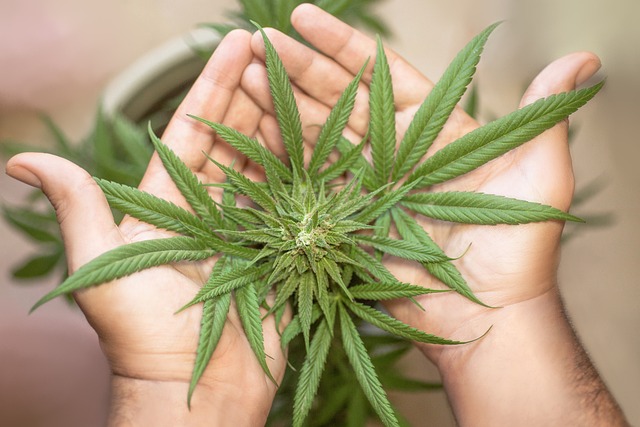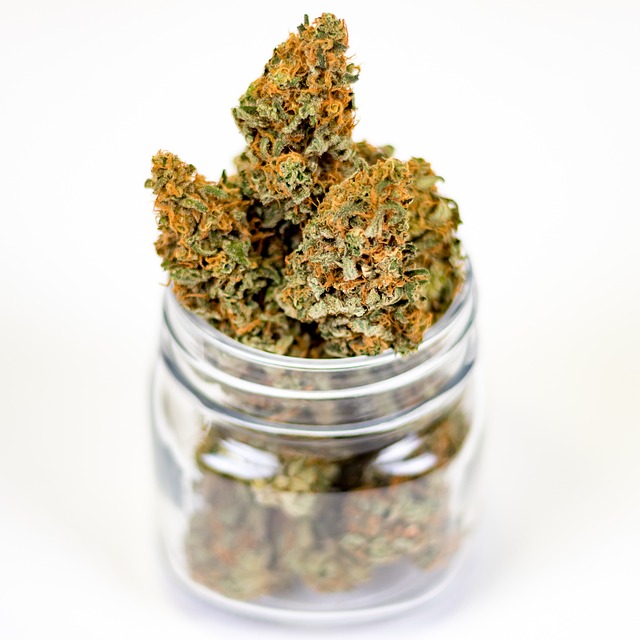The THCA flower, a non-psychoactive component of cannabis, has gained attention for its therapeutic anti-inflammatory properties. Unlike its psychoactive counterpart THC, THCA interacts with the endocannabinoid system to modulate physiological processes without causing a high. Its potential stems from its ability to regulate immune responses and reduce cytokine production, which are critical in inflammation. Engaging primarily with the CB2 receptor, THCA has shown promise as a natural alternative to traditional anti-inflammatory drugs, with fewer side effects. Research is ongoing to explore its application in treating various inflammatory conditions such as arthritis, multiple sclerosis, and skin inflammations. Cultivating THCA flower requires careful management of environmental factors to ensure a high concentration of anti-inflammatory cannabinoids. After harvest, THCA can be consumed in different forms, including smoking, edibles, topicals, and tinctures, allowing for various effect durations and onsets. While the benefits are promising, it's essential to consult healthcare professionals before incorporating THCA flower into health regimens, especially when combined with other treatments or for those with pre-existing conditions.
Explore the therapeutic properties of THCA flower, a natural source of potent anti-inflammatory compounds. This article delves into the benefits and best cultivation practices for harnessing these compounds effectively. Understanding the science behind THCA’s anti-inflammatory effects sets the stage for leveraging this botanical wonder to enhance health and well-being. Join us as we explore the transformative potential of THCA flower and its role in promoting natural healing and relief from inflammation.
- Unveiling the Potency of THCA Flower: A Deep Dive into Its Anti-Inflammatory Compounds
- Cultivating and Utilizing THCA Flower for Optimal Anti-Inflammatory Benefits
Unveiling the Potency of THCA Flower: A Deep Dive into Its Anti-Inflammatory Compounds

Delta-9-tetrahydrocannabinolic acid (THCA) is a non-psychoactive compound found in cannabis flowers that has garnered attention for its potential therapeutic benefits, particularly its anti-inflammatory properties. Research indicates that THCA interacts with the body’s endocannabinoid system, influencing various physiological processes without the psychoactive effects associated with its decarboxylated form, THC. The anti-inflammatory compounds present in THCA flower are believed to stem from its ability to modulate the immune response and reduce cytokine production, which are key drivers of inflammation. This makes THCA a compelling subject of study for those seeking natural alternatives for managing inflammatory conditions.
Furthermore, the anti-inflammatory efficacy of THCA is attributed to its interaction with the CB2 receptor, which is closely associated with regulating immune responses and maintaining homeostasis. Unlike some pharmaceutical anti-inflammatories, THCA is a natural compound that may offer a safer alternative with fewer side effects. Its potential applications span a wide range, from arthritis and multiple sclerosis to various skin conditions characterized by inflammation. As such, the exploration of THCA flower’s anti-inflammatory compounds holds promise for advancing therapeutic interventions in the realm of natural medicine.
Cultivating and Utilizing THCA Flower for Optimal Anti-Inflammatory Benefits

Cultivating THCA flower, a rich source of cannabinoids, offers a promising avenue for those seeking natural anti-inflammatory benefits. THCA, or Tetrahydrocannabinolic Acid, is the raw form of THC found in cannabis plants, and it has been studied for its potential therapeutic properties. Growers interested in harnessing these benefits should focus on optimal growing conditions, including soil quality, lighting, and temperature, to ensure a robust and potent crop rich in THCA. The anti-inflammatory compounds within the THCA flower work by interacting with the body’s endocannabinoid system, which plays a role in regulating inflammation and pain responses. This interaction may help alleviate symptoms associated with various inflammatory conditions without the psychoactive effects typically associated with THC.
Once cultivated, utilizing the THCA flower in a variety of forms can maximize its anti-inflammatory potential. Consumers can opt for traditional smoking methods or explore alternative consumption options such as edibles, topicals, and tinctures. Each method offers different advantages in terms of onset and duration of effects, allowing individuals to tailor their use according to personal needs and preferences. It’s important to note that while the THCA flower holds promise for its anti-inflammatory properties, further research is necessary to fully understand its efficacy and optimal utilization within various health and wellness regimens. Users should always consult with healthcare professionals before incorporating THCA or any cannabis product into their health routine, especially if they are taking other medications or have pre-existing health conditions.
THCA flower tips emerge as a noteworthy source of anti-inflammatory compounds, offering potential health benefits for those seeking natural relief from inflammation. The cultivation and responsible use of these compounds are crucial for maximizing their therapeutic effects. As the understanding of THCA’s properties continues to evolve, it is clear that this natural substance holds promise in the realm of holistic health practices. With careful consideration given to cultivation methods and dosage, individuals may harness the anti-inflammatory potential of THCA flower tips effectively.
